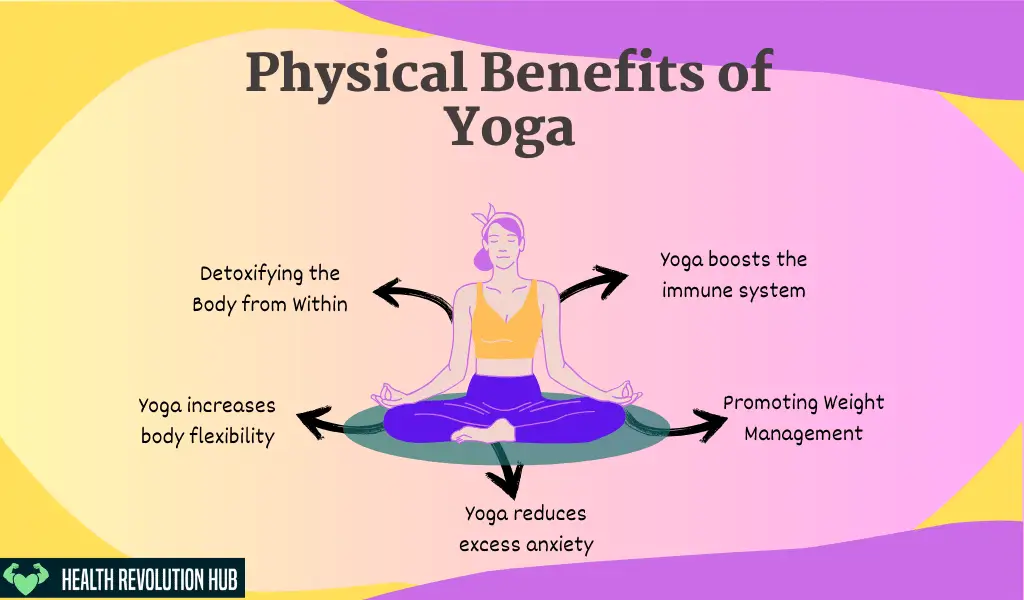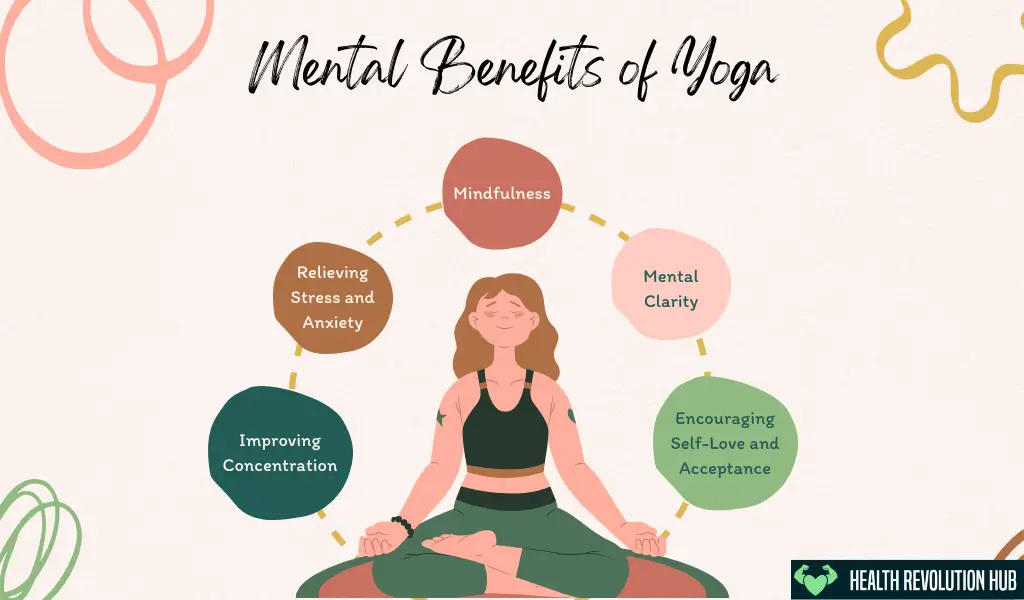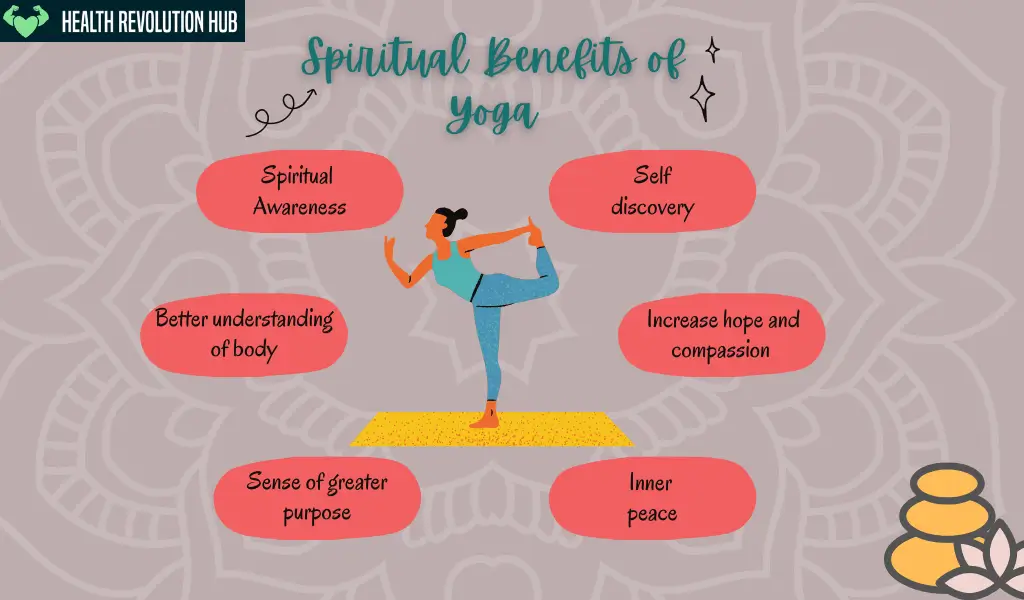You must have heard that yoga makes your body strong and flexible but that’s not it. The benefits of yoga are far beyond than that, it also gives your mind clarity, boosts your energy levels, and keeps your emotions steady. By reading this article you will not only know the benefits of yoga but also know different types of poses of yoga which can give you the exact benefit you want. With that being said let’s dive in
An Introduction to Yoga
Before I go further let me tell you a little history about yoga. Yoga, a practice that originated thousands of years ago in ancient India, has now become a popular activity embraced by people worldwide. Its ability to provide numerous physical, mental, and spiritual benefits has made it a valuable tool for those of you who are seeking a holistic approach to your overall well-being.
Benefits of Yoga: Enhancing Mind, Body, and Spirit
At its core, yoga is not just a physical exercise but a way of life that encompasses the union of mind, body, and spirit. It aims to create harmony and balance within oneself, allowing you to tap into your inner potential and experience a deeper level of connection with yourself and the world around you.
The Physical Benefits of Yoga

1. Enhancing Flexibility
By regularly practicing yoga poses like the Mountain pose, Child pose and Pigeon pose, you can gradually increase your range of motion, loosen tight muscles, and enhance your overall flexibility.
The elasticity not only promotes better posture and alignment but also reduces the risk of injuries in daily activities.
2. Building Strength
Through the Warrior pose, Plank pose, and Triangle yoga posture, you can effectively build strength in your muscles, including both the superficial muscles and the deeper muscle groups that are often neglected.
Yoga poses engage and challenge different muscle groups, leading to increased overall strength and toned physique.
3. Improving Balance
Yoga requires you to maintain balance in different poses such as the Tree pose and Half moon pose, which helps develop core strength and stability.
With regular practice, yoga can improve both static and dynamic balance, allowing you to feel grounded and steady in your daily lives.
4. Boosting Endurance
Regular practice of yoga sequences, such as Vinyasa or Ashtanga, can significantly improve cardiovascular endurance.
By linking breath with movement, yoga helps you increase your stamina and push through physical limitations, enabling you to sustain physical activity for longer periods without exhaustion.
5. Enhancing Posture
Poor posture can lead to various musculoskeletal issues, including back pain, neck pain, and joint problems. Triangle pose and Mountain pose of yoga focus on proper alignment and body awareness, helping you correct your posture and maintain a healthy spinal curvature.
Improved posture not only enhances physical appearance but also contributes to overall well-being.
6. Detoxifying the Body from Within
The practice of yoga involves gentle inversions, twists, and compression poses that can stimulate the lymphatic system.
This stimulation aids in the detoxification process by promoting the circulation of lymph fluid, which carries waste materials away from the tissues and improves immune function.
7. Strengthening Immunity
Research has shown that regular yoga practice can increase the production of antibodies and enhance the activity of immune cells. The combination of physical movement, breath control, and relaxation in yoga supports a healthy immune system, reducing the risk of infections, allergies, and other immune-related disorders.
8. Promoting Weight Management
Yoga can be an integral part of a weight management journey. The physical activity involved in yoga burns calories, increases metabolism, and helps build lean muscle mass.
Additionally, the mindfulness cultivated through yoga practice can lead you to a more balanced relationship with food and a greater awareness of your body, facilitating healthy eating habits and promoting weight loss or maintenance.
The Mental Benefits of Yoga

1. Mindfulness
Yoga encourages you to practice mindfulness, fully present and aware of the current moment. By focusing on your breath, body sensations, and the present task at hand, yoga helps you maintain a deeper connection with yourself, promoting a sense of inner peace and contentment.
2. Relieving Stress and Anxiety
Yoga offers you a valuable tool to manage stress and anxiety. Through a combination of physical movement, breath control, and meditation, yoga activates the relaxation response in the body, reducing stress hormones and inducing a state of calmness.
Regular yoga practice can help you develop coping mechanisms to deal with stress and maintain mental well-being.
3. Mental Clarity
Yoga incorporates focusing techniques that improve mental clarity and concentration. By paying attention to breath and body sensations, you can train your mind to stay focused and present.
This enhanced mental clarity translates to improved cognitive abilities, such as better decision-making, problem-solving, and memory retention.
4. Improving Concentration
In our fast-paced world filled with distractions, cultivating the ability to concentrate on a single task is invaluable. Yoga teaches you to quiet the mind, let go of external distractions, and hone your focus on the present moment.
As a result, you can enhance your productivity and efficiency in both professional and personal endeavors.
5. Emotional Well-being
Yoga offers a safe space to explore and nurture emotions, allowing you to connect with your positive and negative feelings in a non-judgmental way.
Through mindfulness practices and self-reflection, yoga helps you develop emotional intelligence, fostering a positive mindset and promoting emotional resilience.
6. Encouraging Self-Love and Acceptance
Central to the practice of yoga is the acceptance and love for oneself. Yoga encourages you to embrace your bodies, minds, and souls, exactly as they are in the present moment.
This self-love and acceptance radiate beyond the yoga mat, transforming your relationship with yourself and others.
7. Supporting Mental Health
Yoga has been increasingly recognized as a valuable therapeutic tool for those of you who are dealing with mental health conditions. It can complement traditional therapies by providing you with coping strategies for managing symptoms of anxiety, depression, trauma, and other mental health disorders.
The combination of physical movement, breathing exercises, and mindful practices in yoga can have a profound positive impact on overall mental well-being.
The Spiritual Benefits of Yoga

1. Connecting with the Higher Self
Yoga provides you with a pathway to connect with your higher self or inner consciousness. Through meditation, self-reflection, and the practice of selflessness, you can awaken a deeper sense of spirituality and tap into your innate wisdom and intuition.
2. Spiritual Awareness
In a world focused on material possessions and external achievements, yoga offers you an opportunity to go beyond these transient aspects and explore the deeper meaning of life.
Through the practice of yoga, you can deepen your spiritual awareness, connecting with the divine or universal consciousness that exists within and around them.
3. Inner Serenity
Yoga allows you to experience moments of inner stillness and tranquility, even amidst the chaos of daily life. Through meditation, breathing techniques, and the embodiment of yoga philosophy, you can cultivate a sense of inner serenity, transcending the fluctuations of the mind and finding peace within yourself.
4. Compassion and Empathy
Yoga teaches you to extend compassion and empathy not only to yourself but also to others. As you become more attuned to your inner self through yoga, you develop a greater awareness of the interconnectedness of all beings, fostering a sense of unity, kindness, and compassion towards others and the world at large.
5. Self-Discovery
Yoga acts as a powerful tool for self-discovery and self-exploration. By quieting the mind, observing inner thoughts and emotions, and embracing the practice of self-reflection, you can peel away layers of conditioning and societal expectations, revealing your authentic self and finding a sense of purpose and fulfillment.
The Holistic Effects of Yoga on Overall Well-being
1. Harmonizing Mind, Body, and Spirit
Yoga’s holistic approach to well-being strives to unite and harmonize the mind, body, and spirit, recognizing that they are intrinsically interconnected. By nurturing all aspects of oneself through yoga, you can experience a profound sense of wholeness and integration in your lives.
2. Promoting Restful Sleep
Quality sleep is essential for optimal health and well-being. Regular practice of yoga, especially relaxing poses and restorative sequences, can help you unwind, release tension, and prepare your body and mind for a restful night’s sleep. By incorporating yoga into your bedtime routine, you can enjoy improved sleep quality and wake up feeling refreshed and rejuvenated.
3. Alleviating Chronic Pain
Yoga has been found to be effective in alleviating chronic pain, such as back pain, joint pain, and fibromyalgia. The gentle movements, stretching, and strengthening exercises in yoga help to improve flexibility, relieve muscle tension, and enhance blood flow, providing you with a natural and holistic approach to managing pain and promoting healing.
4. Enhancing Energy Levels
Yoga practices, including dynamic flows and specific breathing techniques, can increase energy levels and revitalize the body and mind. By activating the vital life force within, known as prana, yoga helps you to overcome fatigue, increase vitality, and experience a renewed sense of energy and enthusiasm for life.
5. Balancing Hormones
Yoga can have a positive impact on hormonal balance within the body. Certain yoga poses and relaxation techniques help regulate hormone production and reduce stress levels. This balance in hormones contributes to improved overall well-being, including menstrual health, fertility, and emotional stability.
Frequently Asked Questions (FAQs)
A. Is yoga suitable for everyone, regardless of age or fitness level?
Yoga is a versatile practice that can be adapted to suit individuals of all ages and fitness levels. Regardless of your starting point, there are modifications and variations available to ensure a safe and enjoyable practice. It is important to listen to your body and work within your own limits while gradually progressing in your yoga journey.
B. Can yoga help in managing specific health conditions?
Yes, yoga can be beneficial in managing various health conditions. It is always recommended to consult with a healthcare professional or certified yoga instructor who can provide guidance and tailor the practice to your specific needs. Yoga has been known to help with conditions such as chronic pain, stress-related disorders, cardiovascular health, respiratory conditions, and more.
C. Can yoga be beneficial during pregnancy and postpartum?
Yoga during pregnancy and postpartum can offer numerous benefits for both the mother and baby. Prenatal yoga can help with maintaining physical fitness, relieving discomfort, reducing stress, and preparing the body for childbirth. Postpartum yoga can aid in the healing process, restoring strength, and promoting overall well-being. It is essential to seek guidance from a qualified prenatal or postnatal yoga instructor to ensure a safe and appropriate practice.
D. What are the different types of yoga practices and their specific benefits?
There are various types of yoga practices, each with its own focus and benefits. Some popular types include Hatha yoga, Vinyasa yoga, Ashtanga yoga, Bikram yoga, Yin yoga, and Restorative yoga. Hatha yoga emphasizes physical postures and breathing exercises, Vinyasa yoga links breath with movement, Ashtanga yoga follows a structured sequence of poses, Bikram yoga is practiced in a heated room, Yin yoga targets deep connective tissues, and Restorative yoga focuses on relaxation and rejuvenation. The specific benefits vary depending on the style, but overall, yoga practices promote physical strength, flexibility, stress relief, and mental clarity.
E. How often should one practice yoga to experience its benefits?
The frequency of yoga practice depends on individual goals, schedules, and preferences. Starting with two to three sessions per week is a good foundation, allowing for progress and integration of the practice into daily life. Gradually, you may benefit from practicing yoga daily or as often as your schedule permits. However, it is essential to prioritize consistency over intensity to experience the long-term benefits of yoga.
F. Is having prior experience or being flexible to start yoga necessary?
No prior experience or flexibility is necessary to start practicing yoga. Yoga is a journey that begins wherever you are in the present moment. With time and regular practice, flexibility and strength will naturally improve. The beauty of yoga lies in the process of self-discovery and self-acceptance, honoring your unique body and its capabilities.
Conclusion
Yoga offers a transformative journey that encompasses the enhancement of mind, body, and spirit. From physical fitness and mental well-being to spiritual growth and holistic harmony, the benefits of yoga are vast and profound. By embracing the practice of yoga, you can unlock your inner potential and cultivate a fulfilled and balanced life.
Yoga invites us to go inward, listen to our bodies, and connect with ourselves on a deeper level. By embracing yoga, we embark on a transformative path that can nourish and awaken our mind, body, and spirit, allowing us to live a more vibrant, purposeful, and meaningful life.








